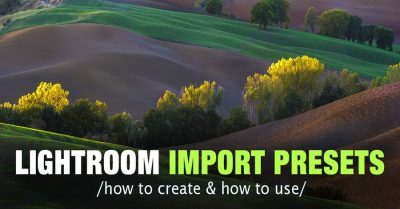On this article, I’ll share tips on how to cull pictures in Lightroom quick and in probably the most environment friendly manner.
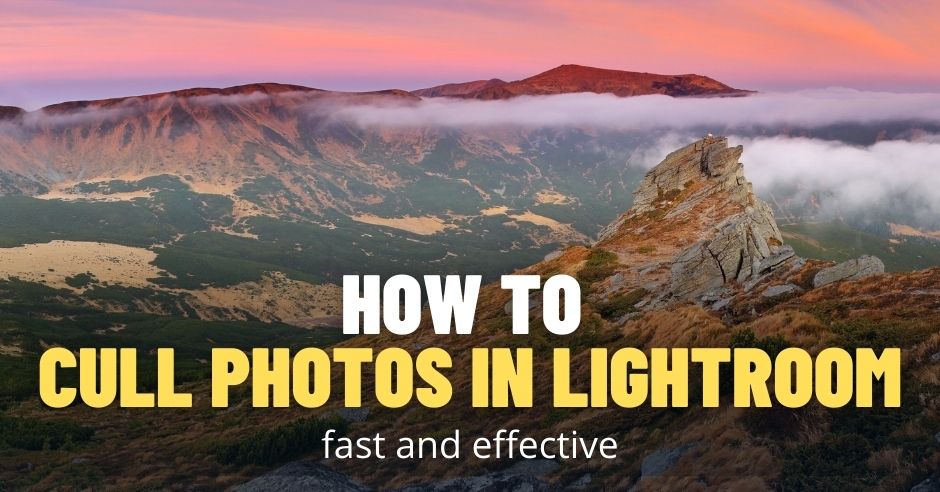
Digital pictures tools just isn’t low cost. However there’s virtually no additional price to take a further picture in distinction with movie pictures. In consequence, almost all of us overshoot, taking extra photographs than essential. It prices us dearly within the time we spend culling and processing.
Once I realized that, on common skilled photographers spend between 10% and 14% of their time culling photographs in picture organizing packages, I used to be shocked. It additionally motivated me to streamline and optimize my culling course of in Lightroom. With the brand new culling method, I’ve extra time for exploring and touring and fewer time in entrance of a pc.
What’s Culling in Pictures?
Culling, also referred to as “trimming,” is the method of eradicating undesirable pictures out of your library and figuring out ones you need to hold. The purpose of culling is to cut back the variety of photographs to probably the most interesting and technically sound ones with the potential for publishing or delivering to shoppers.
In digital pictures, you carry out culling utilizing picture group packages like Lightroom, Bridge, Photograph Mechanic, and many others.
How To Cull Photographs In Lightroom Quick
To cull pictures in Lightroom quick and efficient, I repeat the next steps each time:
- Import all new pictures right into a single folder
- Rename all photographs throughout the import
- Reject undesirable pictures by flagging them with the keyboard shortcut “X”
- Use the shortcut “P” to flag the pictures you need to hold (keepers)
- Use the colour labels to ented the “keepers” to the enhancing funnel
- Delete the rejected pictures
Photograph Group on Exhausting Drive
Earlier than you begin culling your picture assortment, be sure to have a complete and logical folder construction in your pc’s onerous drive.
Listed below are some tips I observe when managing my picture library:
Use the Quickest Drive for New Photographs
Once you handle bigger picture libraries in Lightroom, its efficiency and responsiveness undergo. Ensure to decide on the quickest onerous drive on your picture library. Stable-state drives (SSD) are the most suitable choice. I take advantage of Samsung EVO SSD drives.
If the price of SSDs is prohibitive to host big libraries, you possibly can strive utilizing my lifehack. I hold solely latest picture collections on my SSD drive, and when I’m finished with the culling and processing, I transfer them to my largest spinning onerous drive, the place my whole picture library resides.
Preserve All Your Photographs In One Place
The worst doable situation for organizing your pictures is is to retailer them somewhere else in your pc. It makes it tough to seek out them, and the method of backing up your library turns into a nightmare.
Right here is the construction I take advantage of for my picture library:
I hold all my pictures contained in the grasp folder MY PHOTO ARCHIVE.
Contained in the grasp folder, I manage the pictures by 12 months and by location.
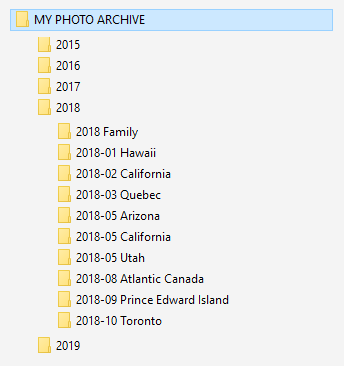
Come Up With A Logical Naming Conference And Stick With It
Yearly I create a brand new folder. For the folder identify, I take advantage of the 12 months solely.
I take advantage of the naming conference contained in the annual folder based mostly on the 12 months, month, and site.
Since I’m a journey photographer and my journeys last more than in the future, I don’t use particular dates.
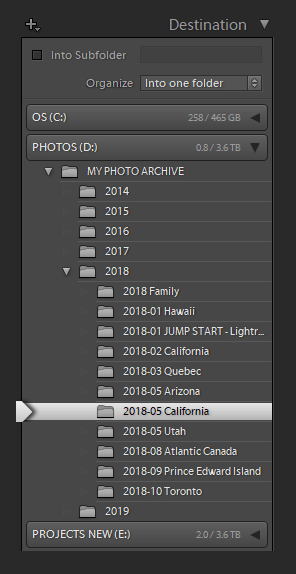
However, if you’re an occasion photographer, together with the exact date within the folder identify will be useful.
For all my pictures, I take advantage of a naming conference the place I point out the precise date I took the picture, location, and the unique file identify generated by the digital camera on the time of the taking pictures.
I rename my pictures throughout the import course of utilizing the file renaming template (see the subsequent part).
Importing Photographs to Lightroom
You can’t cull or course of your new pictures till you import them to Lightroom.
First, I create a brand new folder on a tough drive inside my grasp library underneath the corresponding 12 months.
Subsequent, I launch Lightroom and activate the Import module.
I specify the place I need to import all my new pictures, pointing to the newly created folder.
I additionally use the Title Renaming Template to rename all my RAW recordsdata throughout the import.

After renaming, all my pictures have the next naming construction:
20190417_California_DSF0211.RAW
20190417_California_DSF0211.RAW
For extra info, please verify my devoted tutorial right here.
For the reason that import course of is sluggish and it might take hours to import numerous pictures, I often begin the method earlier than going to mattress. Once I get up the next morning, all my photographs are imported, the previews are generated, and I’m prepared to begin the culling course of.
Rejecting Unwaten Photographs
Within the Lightroom Library module, I activate the Loop View by hitting the E shortcut or by clicking on the Loop View icon on the backside left nook.
To mark a photograph as REJECTED, use the shortcut X. The rejected picture will probably be greyed out, and the reject flag will probably be added.

By default, after rejecting any given picture, you should use the arrow key to advance to the subsequent picture until you activate the ADVANCE mannequin.
You activate the AUTO ADVANCE mode by hitting the shortcut CAPS LOCK, which tells Lightroom to advance to the subsequent picture after flagging any given picture.
I at all times use the AUTO ADVANCE mode; it’s a big time saver.
When flagging the pictures as rejected, I at all times search for apparent flows comparable to out-of-focus pictures, unintended pictures, pictures with flawed publicity (blown highlights, clipping shadows). In the event you cull pictures with individuals, the obvious flows is usually a mannequin with closed eyes or in an ungainly pose.
I’m going by a complete assortment of recent pictures in a matter of minutes, concentrating solely on one process, flagging undesirable pictures as rejected.
Flagging Keepers
Figuring out the keepers is my favourite step of the culling course of.
I take advantage of a routine much like the earlier step. However as a substitute of rejecting pictures, I flag probably the most thrilling photographs because the keepers. I plan to course of and publish them sooner or later and hopefully embody one of the best ones in my portfolio.
I press shortcut E to enter the Loop View of the Library Module.
I additionally hit the CAPS LOCK key to activate the AUTO ADVANCE mode.
Subsequent, I’m going by all the folder of pictures one after the other, attempting to identify the pictures I need to hold.
I take advantage of the shortcut F to flag the chosen picture as a keeper. The Lightroom provides the flag icon to them.

The method of flagging the keepers takes longer in comparison with rejecting undesirable pictures. It’s a very subjective course of, and generally it takes a judgment name to flag or to not flag a selected picture.
By the top of this step, I’ve three varieties of photographs: flagged (keepers), rejected, and pictures with none flags.
What Occurs to Photos With out Flags?
I hold them. Photographs with out flags usually are not going to my processing funnel, however I don’t delete them.
I’ve a routine to undergo my unflagged pictures annually or so with the hope of discovering initially missed jewels. And I usually uncover photographs with nice potential.
At this level, the culling course of is accomplished. I deleted undesirable photographs, and I recognized pictures able to be processed.
Now I need to present you ways my culling course of logically transitions to the processing section.
Deleting Rejected Photographs
The ultimate step is to delete rejected pictures and neglect about them.
Use the keyboard shortcut CMD + DELETE (Mac) or CTRL + BACKSPACE (Home windows).
Use the highest menu: Photograph > Delete Rejected Recordsdata.
Good Collections Enhancing Funnel
The subsequent step is to maneuver all my “keepers” (flagged pictures) to my enhancing funnel to assist me to trace the progress.
I take advantage of 3 Good Collections for my enhancing funnel: Candidates, Processing, Printed.
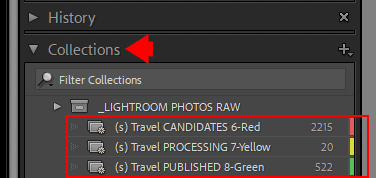
The Good Assortment in Lightroom is a dynamic choice of pictures generated by Lightroom mechanically based mostly on predefined guidelines you specify.
In my case, I take advantage of Good Collections based mostly on the Colour Labels.
For instance, once I add the coloration label RED to any picture, Lightroom mechanically provides it to the Candidate Good Assortment.



Transferring Photographs By way of Processing Funnel
Once I end the culling course of, I take advantage of the Lightroom filter to show flagged photographs solely. Subsequent, I choose all of them (Ctrl+A).
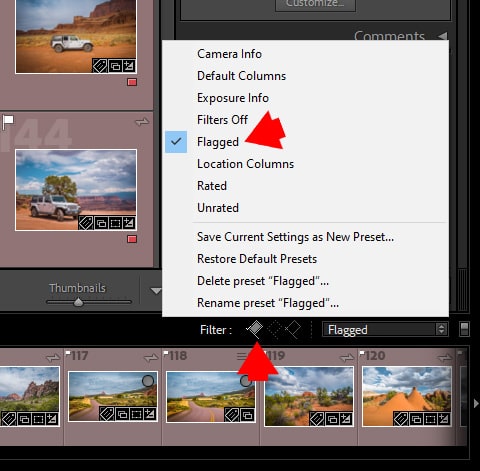
I press the 6 key to use the RED coloration label to all chosen pictures. Lightroom provides the colour label to the pictures and, on the similar time, triggers the Good Assortment rule and provides all labeled pictures to the CANDIDATES good assortment.
Now, I’ve “keepers” added to the enhancing funnel.
Relying on the undertaking I’m engaged on or the tutorial I’m writing, I’m going to the CANDIDATES good assortment and search for the pictures that assist me illustrate my tutorial and articles.
Once I discover a appropriate candidate, I press the 7 keyboard key so as to add a YELLOW coloration label to the chosen picture. It additionally tells Lightroom to take away the picture from the CANDIDATE good assortment and add it to PROCESSING good assortment.
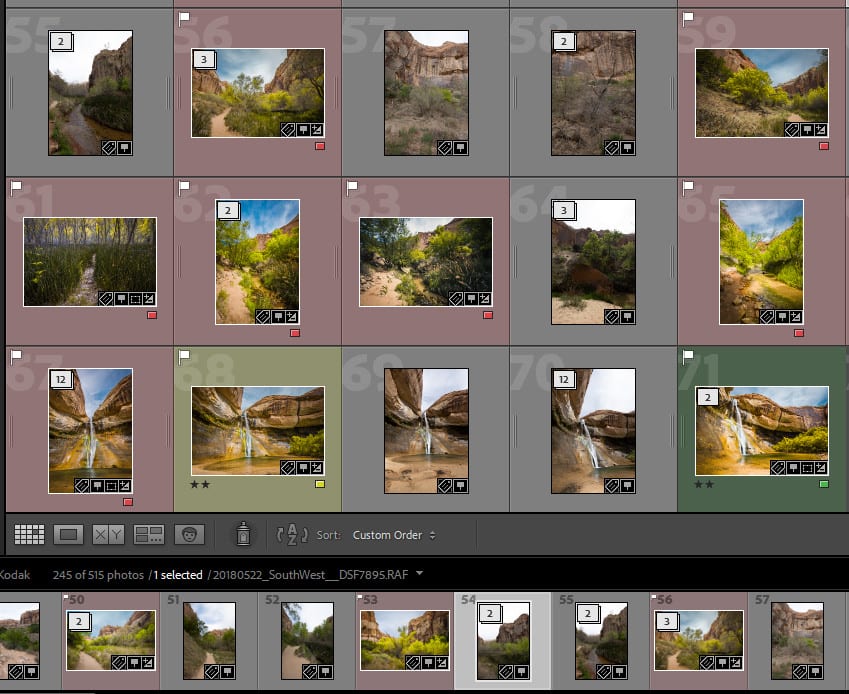
The picture stays within the CANDIDATE assortment till I end processing and am able to export the ultimate model from Lightroom.
That is once I use keyboard key 8 to alter the coloration label from YELLOW to GREEN. It additionally removes the picture from PROCESSING good assortment and strikes it to the PUBLISHED good assortment.
The PUBLISHED good assortment is the ultimate vacation spot of my enhancing funnel.
Exporting Remaining Photographs Utilizing Export Presets
The ultimate step is to export the processed picture from Lightroom for publishing or printing.
I take advantage of the Export Presets I developed over time based mostly on my wants, so I don’t waste any time fidgeting with the limitless export choices.
You possibly can be taught extra in regards to the Export Presets within the devoted article, and be at liberty to obtain the Export Presets I take advantage of.
Methods to cull pictures in Lightroom: Conclusion
As you possibly can see, the culling in Lightroom is a multistep course of which you could customise and absorb any path you need.
Articles Associated to “Methods to Cull Photographs in Lightroom Quick“
I hope my culling course of will encourage you to develop the culling workflow that matches your type of pictures and your enhancing.


